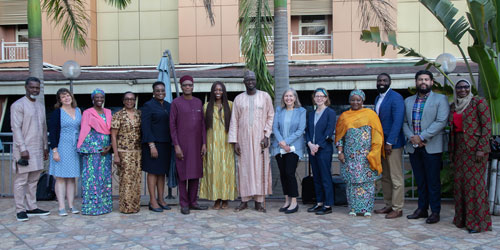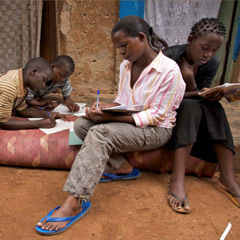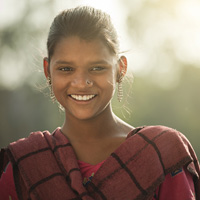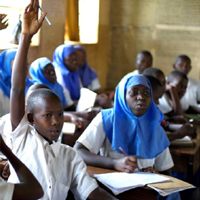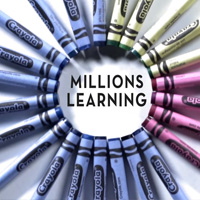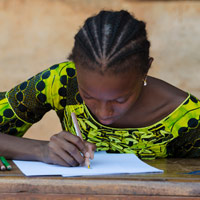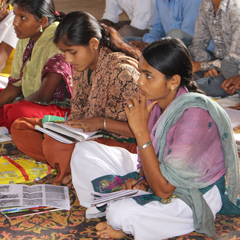
A partnership of five philanthropic organizations announced nearly $8 million in grants and a commitment of an additional $10 million in 2013 for innovative projects that will increase the participation, quality, and relevance of secondary education for economically disadvantaged and marginalized children in developing countries.
The MacArthur Foundation, The MasterCard Foundation, ELMA Philanthropies Services, Human Dignity Foundation, and another funder are growing their collaboration through the Partnership to Strengthen Innovation and Practice in Secondary Education, issuing a second call for proposals to support innovative initiatives that provide learning opportunities and life and livelihood skills for underserved youth between the ages of 12 and 19 in East Africa, Nigeria, and India.
The Partnership was announced in 2012, and received more than 500 submissions in response to its first call for proposals from groups working in secondary education around the world. Nearly $8 million was provided by the partnership in support of 19 projects, exceeding its original commitment of $5 million. See below for a complete list of the grantmaking.
The partners formed the collaboration on the well-demonstrated premise that secondary school education is measurably associated with positive effects on health, wellbeing, and productivity.
Yet secondary education remains scarce in the developing world, particularly for marginalized girls, a focus of the MacArthur Foundation’s grantmaking. Girls with higher levels of education marry later, have smaller families, survive childbirth at higher rates, experience reduced incidences of HIV/AIDs, have children more likely to survive to age five, earn more, and contribute to higher rates of economic growth at the national level.
We are looking for fresh thinking about providing quality secondary education, so that every child has a chance at living a fulfilled life and contributing to his or her local community and our global society.
“Education beyond primary school remains out of reach for millions of children, especially girls,” said Barry Lowenkron, Vice President of International Programs for the MacArthur Foundation. “Low- and middle-income countries have a tremendous opportunity to pull citizens out of poverty by educating girls to the same standards as boys. We are looking for fresh thinking about providing quality secondary education, so that every child has a chance at living a fulfilled life and contributing to his or her local community and our global society.”
“Secondary education is a vital tool of social transformation, as it is the bridge that connects young women and men to better futures, either in higher education or the workforce,” said Deepali Khanna, Director of Youth Learning at The MasterCard Foundation. “This initiative will bring new thinking and innovative ideas to our shared effort to empower young people to break cycles of poverty and be able to learn and prosper.”
In 2013, the collaborating organizations will focus on funding projects that pilot new approaches, bring to scale successful models, and research critical questions about how to innovate in secondary education. Four thematic areas of interest have been identified: increasing demand for secondary-level learning, improving teacher skills, promoting employment-relevant skills, and promoting alternative education models. Collectively, projects will effect immediate change in communities where pilot programs are conducted and will contribute to a growing base of evidence on secondary education. Projects supported will emphasize evaluation to document clearly what works and the integration of the use of technology in education in developing countries, as well as the delivery of secondary education in conflict-affected populations.
The partners were brought together as early supporters of A Global Compact on Learning, a policy agenda for access to education and quality learning in the developing world, coordinated by the Brookings Institution’s Center for Universal Education. The report informed the UN Secretary General’s five-year Global Education First Initiative, which seeks to refocus international attention on quality, relevant, and inclusive education for children at all levels and that aims to enroll an additional 61 million students worldwide by 2015. The Partnership was cited among the initial commitments to the Initiative at its launch at the 2012 UN General Assembly.
View details about the partnership’s 2013 call for proposals and the selection process.
First round support from the Partnership to Strengthen Innovation and Practice in Secondary Education:
- African Population and Health Research Center: $519,000 to improve learning outcomes and enhance secondary school participation of disadvantaged girls in urban informal settlements in Kenya through action research.
- The Akanksha Fund: $477,000 in support of an initiative to train a new generation of school leaders in order to improve learning outcomes among low-income children in India.
- Asante Africa Foundation: $500,000 to scale up an integrated, child-centered educational model to elevate the quality of secondary school teaching, foster the development of critical thinking skills, and improve learning outcomes for youth in secondary schools in rural Tanzanian communities.
- British Council: $476,000 to assess the availability and effectiveness of in-service teacher trainings and their impact on learner achievement and outcomes across several states in Nigeria.
- Build Africa: $480,000 in support of research into how to address barriers to children’s transition from primary to secondary school in Uganda.
- Co-Creation Hub Limited: $292,000 in support of an education technology pilot program using mobile phone applications in Lagos State, Nigeria.
- Development Research and Policy Center: $425,000 in support of efforts to strengthen the implementation of new secondary school curricula in girls’ schools in Jigawa and Kano States, Nigeria
- Educational Initiatives: $280,000 in support of a benchmarking study to assess language and math achievement of 9th and 10th grade students in government and private schools in the states of Gujarat, Maharashtra, and Rajasthan.
- ERU Consultants: $55,000 to support a study evaluating the impacts of gender composition of teachers on secondary education, including the demand for education among girls and their parents.
- Global e-Schools and Communities Initiative: $519,000 to support a teacher training model that leverages technology to improve science and technology and English in secondary schools in Kenya and Tanzania.
- International Center for Research on Women: $385,000 to help enhance the participation and continuation of adolescent girls in secondary schools in Uganda through research into social norms and expectations related to reproduction and family formation.
- International Child Development Initiatives: $514,000 to replicate a successful Indian education model in Kenya and Uganda that mobilizes communities to ensure girls are enrolled and retained in secondary education.
- Population Council: $425,000 to fund the design and evaluation of a pilot intervention in a rural district in the state of Gujarat, India, to support adolescent girls’ transition to and retention in secondary education and to improve learning outcomes by increasing parental and community engagement.
- Pratham USA: $514,000 in support of the Pratham Open School model, an intervention designed to reach girls at risk of dropping out of school and to re-engage those who have already left the formal education system.
- Promoting Equality in African Schools: $496,494 to increase access, retention, and results of secondary school students in rural Uganda through teacher training, income generating activities and improved curricula.
- Results for Development Institute: $793,000 to synthesize and disseminate learnings from projects supported under the donor collaborative, Partnership to Strengthen Innovation and Practice in Secondary Education.
- Sazani Associates: $300,000 to build secondary school teacher capacity and enrich secondary education curriculum with life and enterprise skills training in collaboration with the Ministry of Education and Vocational Training in Zanzibar, Tanzania.
- The Catholic University of America: $92,000 in support of a project to evaluate efficacy of an established teacher training program in Lagos, Nigeria.
- University of Bristol: $410,902 to make textbooks and teaching strategies relevant to and supportive of second language learners in rural secondary schools in Tanzania.
Learn more about our partners:
About The MasterCard Foundation
The MasterCard Foundation is an independent, global organization based in Toronto, Canada, with more than $6 billion in assets. Through collaboration with partner organizations in 49 countries, mostly in Africa, it is creating opportunities for all people to learn and prosper. The Foundation’s programs advance microfinance as well as youth education. Established in 2006 through the generosity of MasterCard Worldwide when it became a public company, the Foundation is separate and independent from the company. Its policies, operations, and funding decisions are determined by its own Foundation Board of Directors and President and CEO. Learn more ›
About ELMA Philanthropies Services
ELMA Philanthropies Services acts as the services arm of the ELMA Group of Foundations. From locations in New York, Cape Town and Dar es Salaam ELMA Philanthropies Services develops program strategies, identifies and explores grant making opportunities, monitors grant performance, and establishes philanthropic relationships for the Foundations. Learn more ›
About Human Dignity Foundation
Human Dignity Foundation (HDF) is an independent, private foundation that works to bring about positive change in the lives of people in Africa & Asia. With a particular focus on enabling children & women to fulfill their rights, HDF works with organisations that are innovative and creative, and that have strong roots in their community. Learn more ›






